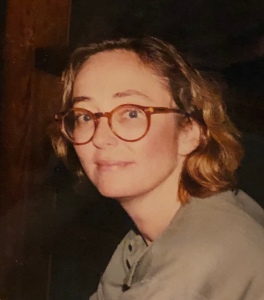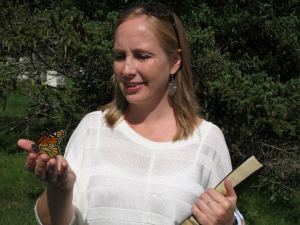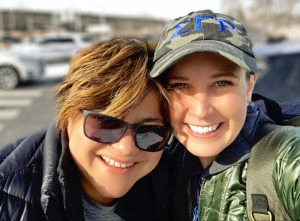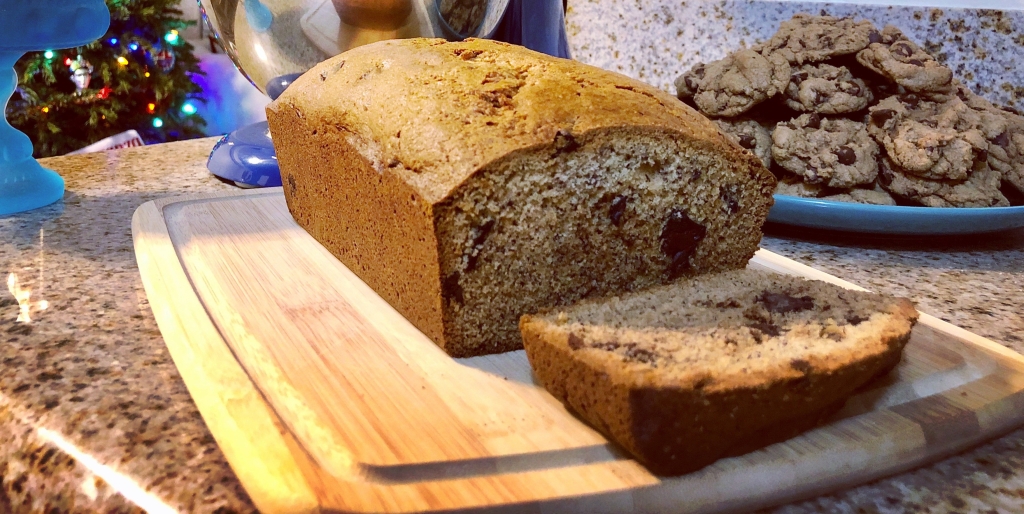Crumbs. Gathering them used to be the first task of sacred ritual with my mother. I would sweep them into a pile, and off the edge of the table into my cupped hand, while my mother put the teapot on to boil. Brushing them off my fingers into the sink, the dance continued as she pulled down the box of English tea from the cupboard. I would select two of the fine, china mugs from the corner cabinet, and finish my portion of the ritual with a pirouette-like turn back to the table. All that was left was to sit and wait, as she brewed the tea extra dark, extra strong, extra bitter, then poured it into the cups – mine with raspberries, hers with a peacock – as we settled in for our two or three or four hour chats.
We talked about all kinds of things at that altar. Bullies at school. My mom’s concern for my lesbian aunt. The boy that I dated for 4-6 years (depending on how we define it) without ever being able to muster up an interest in him to match his passion for me.
My mother’s nickname for me was her Second Brain. I picked up the things that spilled over the edge and held onto them until she needed them. I kept a careful mental record of every time she mentioned that she liked something, so that my father could always know the perfect gift to get her.
Crumbs. Pushing them around on my plate, I sipped tea from a styrofoam cup the day that all of this began to crumble. I sat in a large fellowship hall in a Methodist Church in Pennsylvania. I had driven up from the southernmost tip of Maryland’s Eastern Shore peninsula, where I was appointed to my first two-point charge. It was 2010, and I was there to attend one of the many conversations that my Bishop was hosting on LGBTQ+ inclusivity, in between the General Conferences of 2008 and 2012. I watched as the sacred privacy of my family was broken, as the conversations that were held around our kitchen table were taken into the public. My parents rose to talk about my aunt, about how she had a sad, hard life because she was a lesbian, and how if we were loving we would not encourage people to accept themselves as LGBTQ+, because to do so would be to condemn them to such a hard, sad, sinful life. I had expected to avoid this, having driven the further distance to attend a different District meeting than the one where my parents lived. Yet, I was informed upon arrival that my parents’ passion to speak out against LGBTQ+ inclusivity was so strong that they were driving to each and every District’s meeting to share about my aunt’s sad life.

I wept all the way home. Ashamed of my silence, of my failure to speak up for my aunt. Ashamed that I let my parents begin to build a platform on her back, while she sat somewhere in Pittsburgh unknowing. Yet, I could never tell her, it would break her heart. It was one thing to speak of my aunt that way in the privacy of our own home, but another to speak of her as a sad sinner and a cautionary tale publicly. It had been the constant refrain of my childhood, continually ensuring that this queer little kid would push down the questions that I had about my own identity; ensuring that I would hear the words, “I don’t care who you end up with as long as they make you happy,” without ever thinking that those words were really true. Happiness was not possible for the Queer community. As much joy as my Aunt brought into the world, it was all a performance, because Queer people could not be happy and could not live a full and abundant life. It was a logistical impossibility.
Crumbs. It is no wonder that my Aunt seemed hungry around us, if that is all we were ever willing to feed her. The partial acceptance of who she was. The withholding. The gaslighting. The unspoken undertones of “I love you, but not all of you” – of “I want you to be happy, but that’s just not possible for you” – of “I accept your partner, I just wish she wasn’t in your life” – of “You are the most loving person that we know, it’s just too bad your love is a sin.” Yes, she was sad around us – who wouldn’t be. Yes, she had a hard life – like every other person in my family regardless of their orientation… only the rest of us didn’t get to hang out with NFL players and movie stars.
Let me be clear, my aunt may have been hungry around us because we fed her crumbs, but boy did she eat well elsewhere. Nobody pours the kind of love and light and talent and joy and sacrifice into the world that she did without some of it splashing back on them. She loved hard and she was loved in return. She was a home to the homeless, a mother to the motherless, an anchor for the aimless. She was joy. She was the favorite person of everyone she met. She had the kind of talent that most can only dream about. My grandmother had a closet full of musical instruments in her house; when I asked who played which ones, the answer was Amy every time. Amy, who hung out with Katherine Heigl on set, and insisted she was a sweetheart to the crew. Amy, who talked people off the ledge, both literally and figuratively, and saved lives whether it was bridge-jumpers or Queer kids being fed crumbs of love just like her.

Amy K. Lamb, like her sister Jackie, was also a cancer survivor, and in 2011, a year after my tearful drive back to Maryland, that cancer would finally take her life. I would take the pulpit in Pittsburgh, in front of her NFL friends and her fellow film producers, and I would lead the final celebration of her life. I would stand beside her partner, my Aunt Ana, as we laid her ashes in the ground. As I walked away from the grave in the cold, Pennsylvania wind, a butterfly would appear where one should not have been able to survive. Of course it did, because this was Amy K. Lamb’s burial.
Crumbs. I have struggled my whole life with how to explain that starving someone will not change their appetite, will not change their orientation, will not change their identity. It may make them more willing to gobble up the crumbs we are willing to give them, but it will not change their desire to be loved for the wholeness of who they are.
I remember walking out of a poetry event in Houston a few years ago to find a woman in her 50’s collapsed on the front steps. She was inconsolable. Triggered. She kept insisting that God couldn’t love her, that her momma couldn’t fully love her, because of who she loved. I sat on the pavement with her and others for hours, but there was nothing I could say that could convince her otherwise. It did not matter that I was a pastor. It did not matter that I promised her God loved her. She had been trying to survive on crumbs of love her whole life, and she did not know yet how to eat anything else. There is no other moment in my life in which I felt more impotent as a pastor.
Three years after my aunt’s death, in 2014, I saw Amy’s face come across my computer screen in an article from UM News. “Sister believes in Jesus’ love for lesbian sister”, the headline read, the last painful crumb of postmortem gaslighting offered to my aunt.
“Amy died of cancer in 2011, and Jane is certain she is in heaven. Just as certain as she is that a “gay lifestyle” was not what God wanted for her sister.”

I remember the first time I met my Aunt Ana, Amy’s partner. I was a little kid, bouncing on the bed at my grandmother’s house in a town outside Scranton. Ana did not scold, instead she made me laugh harder than I had in ages. She brought me joy, just like Amy, and without a moment’s hesitation, I let her into my heart as my youngest, funnest Aunt. When I was assigned to my first church, and had to make that long drive down to Maryland the day after Thanksgiving, Ana was the only person who would make the sacrifice to help me move. I had just turned 27, and I was driving alone five hours straight south, and then twenty minutes west into the marshes. I was moving into a big, empty house, all by myself, and becoming the pastor of two churches on the same day. Ana was the only one willing to go with me.
Ana was not my Aunt Amy’s “gay lifestyle,” she was the love of her life. When Amy met Ana, she was in Paris, on her way to a tour of French wine country. She left for the trip with her friends, but could not get Ana out of her mind. She rushed back to Paris, found Ana, and they were inseparable for the rest of Amy’s life. Theirs was the greatest romance in my family’s history.
I scrolled below the pictures of my mother and my aunt, to the article below.
“Jane L. Bonner is president of the Eastern Pennsylvania Evangelical Connection and a strong advocate for The United Methodist Church’s position that “homosexuality is incompatible with Christian teaching” and that God intends marriage to be only between a man and a woman.”
“Bonner attended both days of the trial of Frank Schaefer, the pastor who performed his son’s wedding ceremony. She also helped write a letter sent to Johnson calling for her to hold the pastors who officiated at the Arch Street same-sex wedding “accountable to their ordination vows.”
On cursory glance, the point that was being attempted was that people could be gay and sinners, but still worthy of love not condemnation. The point that was truly being made was that people could call their family members sinners and tell them they were not receiving the abundant life Jesus had planned for them, and still expect them to receive that as love.
This article was not about Amy. It was not about fighting to make the church more accepting of Amy. This was about proudly fighting to make sure that Amy could never be married in a Methodist church, while simultaneously pretending that my Aunt did not know whether my parents would have supported her marriage.
It does not work that way. One cannot fight with every part of yourself to keep lesbians from being able to marry, and expect your lesbian sister to not know your feelings on the topic.
Neither can you commit every fiber of your being to the fight against Queer clergy, commit vocally to vote against their existence at General Conference, and have your Queer clergy daughter not know your feelings on the topic.
Crumbs.
When I finally came out to my mother, I heard an angry tone on the other side that I had not heard before, that could not be hidden anymore. “Well, I feel sorry for you,” she spit out. “You are going to have a hard, sad life. But don’t think you get to surprise me. I’ve known for a long time. Don’t think you get to pull a fast one on me. I’ve known for a long time.”
“Do you realize what you’re saying, mom? The biggest fight of your life has been against Queer clergy, and you’re saying that you knew that is what I am?”
It was my worst fear coming to life. That my mother knew that I was Queer clergy, and that she still had committed her life to fighting against our existence, to stripping me of my credentials and banning me from my vocation.
“Well, you’ve never heard my perspective,” she said.
This she said to her Second Brain, to the one who listens so carefully and retains everything; to the one who had heard little but her perspective all my life, but who had never truly told her mine.
“I have to go mom, we can talk about this later.”
“Well, don’t think you’re going to change my mind.”
“I have to go mom.”
Somehow, it was worse than I could have expected. She reacted as if she had been bracing for this. As if she had been preparing. As if I had an agenda to use my queerness to hurt her. Didn’t she know how many years I had been choking it down? How many years I had been resisting being used against her by those who found it humorous that they could guess the daughter of Jane L. Bonner was queer? Didn’t she know how that robbed me of the support that I needed, and made me a joke instead? Didn’t she know how I had been protecting her, while she waged war on me?
It may not make sense, until you think of all the odd ways that we protect the ones who hurt us… all the ways that Aunt Amy fought like a lion for my mother. Part of me still was, after all, that little girl who swept up the crumbs from her mother’s table, and focused all her imagination on what would make her happy. The little girl who brought home art history books to try to revive the spark of the passion her mother had given up for her children. The little girl who fixed the VCR and the toilet, and put in new countertops, and did whatever she could to make life easier and happier.
I was the little girl, living on crumbs, pieces of love to match the pieces of myself that were acceptable.
I was the little girl, who just wanted to protect her mom, and make her mom happy, and earn her mom’s love. I love my mom; I understand that sometimes we can only give to others the crumbs that have been given to us… but I also know that I am worthy of more.
Which is why… we don’t live on crumbs anymore. You hear me, Amy K. Lamb? We don’t live on crumbs anymore.
I’ve become a baker, and I’m going to bake so many beautiful things for you, so that the Queer kiddos that you loved will never have to live on crumbs again.
You hear me, Amy K. Lamb?
We don’t live on crumbs anymore.
I’m going to bake you cakes with icing so decadent that it will make your teeth hurt.
I’m going to bake you pies with butter-crust hand pressed into the pan so that I leave my mark with every finger print.
I’m going to bake you cookies that are vegan and gluten-free so that anyone and everyone can take a bite.
I’m going to bake you cakes, beloveds, because we don’t live on crumbs anymore.
We don’t live on crumbs anymore.
We are worth so much more than that.
You are worth so much more than that.

Leave a comment